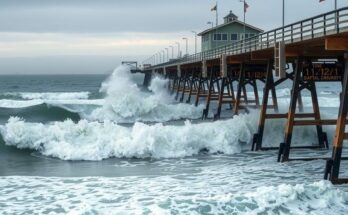Metro Vancouver experienced a magnitude 3.5 earthquake on October 4, 2023, following a recent 3.8 magnitude quake on September 26. Experts express concern about potential future seismic activity due to the proximity of recent earthquakes to urban areas. Professor John Clague emphasizes that while larger earthquakes may occur eventually, recent tremors do not necessarily indicate an imminent threat. Understanding the dynamics of regional earthquakes is vital for preparedness.
On October 4, 2023, Metro Vancouver residents experienced an earthquake registering a magnitude of 3.5 at approximately 2 a.m. The epicenter was located around 18 kilometers west of Delta and east of Ladysmith, B.C., at a depth of 65 kilometers. This tremor followed a 3.8-magnitude earthquake on September 26, which was felt by many across Vancouver Island and even into Washington State. The proximity of these recent seismic events near the Lower Mainland has raised concerns about the potential for a larger earthquake in the area. Professor Emeritus John Clague from Simon Fraser University notes that while earthquakes of lower magnitudes occur daily in British Columbia, those under magnitude 1 often go unnoticed. The recent quakes near the Canadian border and beneath Puget Sound have prompted experts to consider the possibility of future seismic activity closer to Vancouver. Clague mentions, “We have known for quite some time that these earthquakes occur beneath Puget Sound and we know that we get some beneath the Canadian border.” The phenomenon of slab earthquakes suggests that activities below the Strait of Georgia could potentially impact Vancouver. Clague cautions, however, that although smaller earthquakes (magnitude 3 or 4) generally do not cause damage, a magnitude 5 quake could have significant consequences, especially if it were to occur near a populated area. He references a past event in 1975 when a deep, magnitude 5.4 tremor caused buildings in Vancouver to sway. He succinctly states, “It doesn’t mean that we are approaching a magnitude 7 or higher earthquake… it could be little bitty adjustments along the plate boundary.” The elusive ‘Big One,’ often feared by residents, refers to a substantial seismic event anticipated in the future but difficult to predict in terms of timing. This formidable quake, with a magnitude of 8 or 9, has the potential to devastate Vancouver Island and the Lower Mainland, occurring roughly every four to five centuries. Clague suggests that a smaller earthquake along the Juan de Fuca Plate is more likely. The article also discusses whether earthquakes have a tendency to occur at night. Clague suggests that while seismic activity can happen at any time, smaller tremors are less likely to be reported during nighttime hours. He illustrates, “If you are awake, it might feel like someone hit the side of your chair.” The depth of recent earthquakes also plays a role in their perceptibility, with deeper quakes producing diminished surface energy, leading to lesser feelings of disturbance among residents. In general, it is acknowledged that Metro Vancouver is situated within an earthquake-prone region, with minor earthquakes occurring daily. As Mr. Clague states, “We live in earthquake country… but when you get in mag 3 or higher, there is a potential for people to feel them.” Understanding the factors that determine earthquake impact, including magnitude, epicenter location, and depth, is crucial for residents as they await clarity on the region’s seismic future.
The area of Metro Vancouver lies along a significant tectonic boundary where the Juan de Fuca Plate interacts with the North American Plate. This interaction can produce a range of seismic activity, from minor tremors to substantial earthquakes. The region’s geological makeup makes it susceptible to such events, necessitating ongoing research and monitoring by seismologists. Recent earthquakes in the region have raised questions concerning potential future activity and the readiness of local infrastructure to handle larger seismic events.
In conclusion, while recent minor earthquakes in Metro Vancouver have raised concerns about the possibility of a larger seismic event, experts like Professor John Clague assert that while such occurrences may be plausible, predicting an earthquake’s timing and magnitude remains fraught with uncertainty. The focus should thus remain on preparedness and understanding the geological factors influencing seismic activity in the region.
Original Source: www.vancouverisawesome.com




